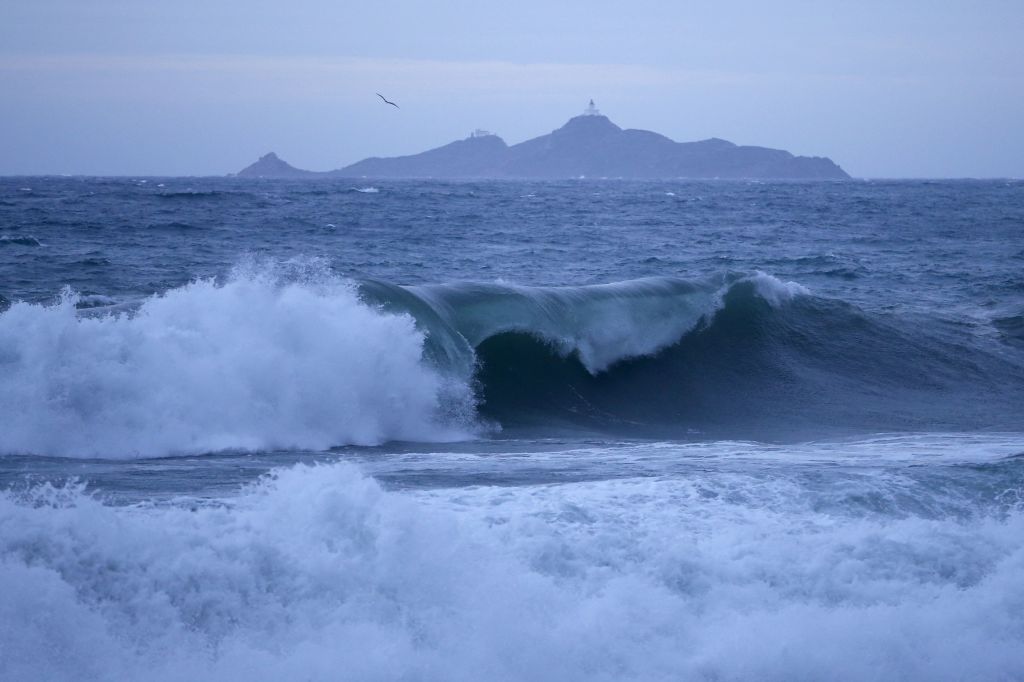Storm Swimmer, Ernest Hilbert’s fifth collection of poems and winner of the 2022 Vassar Miller Prize in Poetry, is obsessed with bodies of water, especially the ocean. Even before the book begins, Hilbert declares this preoccupation through three sea-based epigraphs, running a wide gamut from Apollonius of Rhodes to Rachel Carson and Iris Murdoch. Over the forty-four formally various and adept poems that comprise this ninety-page, seven-section text, Hilbert engages repeatedly with different aspects of the oceanic to dazzling effect.
Often he effects our encounter with the sea through the experiences of the swimmer, who almost always is a struggling figure. Sometimes — as in the case of the title poem — he must contend with the weather: “Without the sun the sea is tangled steel. / No colors survive where waves hike and freeze / The beach and batter the old boards behind.” In other instances, the struggle is chronological. Here’s the opening stanza of “Pelagic”:
I face an ocean, its lurid rush and pull
The same as ever, though I have aged.
I step in — small cool splashes on my calves —
Then shoulder through hard linebacker waves.
I dive beneath a breaker and surface
In hissing warm swells, brine on my lips again.
The seeming constancy of the ocean serves not only as a benchmark for the speaker to assess his body’s waning strength, but to briefly apprehend wide reaches of time that far exceed his (and our) tiny human span. Thus, he is able, at the title poem’s conclusion, to imagine himself “four billion years ago / Or in a time to come, floating without / The earth to save me, as long as I might.” Here, as elsewhere in this collection, the oceanic serves as both obstacle and conduit — delineating the boundaries of the physical, mortal world while demonstrating the freedom of memory and imagination.
Even when the poems do not depict the sea outright, we never feel far from its shores. We find it in the miniature of a family aquarium (“Air and Water”), at a ski resort (“Lodge”), and in a house whose furnace has quit (“In Paradisum”). Hilbert’s oceanic figures might accrue slowly within a poem, as they do throughout the metaphor-rich “She Abides with Me Still”; or they might appear out of nowhere, as with “Range,” an invective in disguise that describes a trip to a shooting range and concludes, staggeringly, when “A shotgun thumps a galaxy / Into a human shape, echoing off the wall, / Surging on the singing seafloor of my skull.”
Another major concern of this collection is the experience of fatherhood. The book is dedicated to Hilbert’s young son, who also figures prominently in several of its finest poems, among them “Endless Mountains,” “K 265,” “Voltage Crackles at the Edge,” and “Last Rites.” The speaker in these father-son poems is vulnerable in feeling yet inventive with language, thereby avoiding almost all the sentimental pitfalls present when writing about one’s children. Surely this is helped, at least in part, by the poet’s frequent and masterful use of meter and (less often) rhyme, which, like apparitions, exert a transparent but tangible influence over the entire collection. (Ghosts and hauntings of all kinds abound in these poems, by the way, a rich subject for a future scholar of Hilbert’s work.)
Hilbert is also quite adroit in the way he continually captures a child’s excitement and inventiveness. This can be seen most readily in “Sole Unquiet Thing,” the book’s concluding poem, which begins:
Afraid to sleep tonight alone, he joins us
In our bed, scrambling over pillow peaks
And furrows of bunched-up blanket.
Overtired at this hour, he clowns for us
And laughs. He balls the sheet and smiles,
“Look, a wave!” For him it is a wave…
The effect here is one of subtle and natural discovery, the boy afloat in the safety of the parents’ bed where first he physically encounters these peaks and furrows and then imagines them as waves. There is a sense of closeness here, though later also of the separation caused by the darkness of the night and the son drifting off to sleep as his father lies awake and watches over him. The poem ends like this:
Sleep well. One day you’ll swim these storms yourself.
There will be snow to cover the wet stones,
And mists arisen to steal the horizons.
Rest, my son. There is always sunlight and sea,
And gales that sweep the margins of our world,
And tall trees lit by lightning in the night.
Here is the father’s burden of facing his own challenges while envisioning those of his child. Here is the son as storm-swimmer-in-training, the inheritor of adult turmoil and struggle, the last line brilliantly containing the unnamed fear that occasioned the poem’s beginning.
Just as all life once sprang from the sea, so too do the subjects and strengths of these poems. The work of an experienced poet approaching the height of his powers, Storm Swimmer truly is a collection — to modify a phrase from Norman Maclean — both haunted and nurtured by waters.
This article was originally published in The Spectator’s May 2023 World edition.

























